As consumer interest in protein-enriched foods continues to grow, food manufacturers are increasingly seeking high-quality, functional ingredients that enhance both nutrition and sensory appeal. Plant-based proteins are interesting as versatile solutions for a wide range of food applications. The use of faba bean is gaining traction in a wide range of savoury applications.
BENEO’s faba bean protein concentrate is a highly functional plant-based ingredient that is making its mark in savoury formulations. What makes it particularly well-suited for these applications? Its pleasant taste, excellent texturising properties and versatile functionality set it apart from other plant proteins. Unlike some alternatives, faba bean protein concentrate has little off-taste, allowing manufacturers to maintain great flavours of end product without requiring extensive masking. Additionally, its light, off-white colour seamlessly integrates into different formulations without compromising visual appeal.
Furthermore, faba bean protein concentrate contributes to a good texture, making it ideal for products like meat alternatives, sauces, bakery and even more. Beyond fully plant-based applications, it is also a valuable ingredient in hybrid solutions, where it can be combined with meat or eggs to create cost-effective, protein-optimized and more sustainable formulations that align with evolving consumer preferences.
Whether used to increase protein content, enhance texture or replace eggs, faba bean protein delivers a sustainable and consumer-friendly solution for the evolving food market.
Faba Bean Protein in Meat and Meat Analogues
The demand for high-quality meat alternatives continues to grow, driven by consumer interest in plant-based or flexitarian diets, sustainability and healthier eating. However, one of the key challenges in formulating meat analogues is achieving the right taste, texture and colour without using artificial additives or excessive flavour masking. This is where faba bean protein stands out as a functional solution. Experts from the BENEO-Technology Center have developed some example recipes that showcase the benefits of faba bean protein.
Frankly Fantastic: Faba Bean Protein for the Perfect Texture
Faba bean protein concentrate supports a firm and sliceable texture in products like frankfurters. Thanks to its light colour and relatively neutral taste, it blends seamlessly into formulations without the need for excessive flavour adjustments or colour enhancers. This makes it easier to develop authentic-looking and great-tasting sausages.
Heat-Stable Texture for Plant-Based Pâté
Texture can be a major challenge in heat-treated plant-based products, but faba bean protein excels in maintaining stability even under high-temperature sterilisation. Faba bean protein concentrate is added in this product because of its high protein content and emulsifying property. Furthermore, it can also contribute to the texture. On top of that, rice starch and Orafti® Inulin are added to further optimize the texture and mouthfeel of this spreadable pâté.
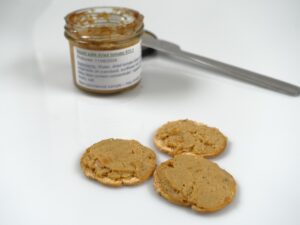
With its versatile functionality, pleasant taste and process stability, faba bean protein concentrate is a valuable ingredient for manufacturers looking to develop next-generation meat (analogues) that meet both consumer expectations and industry demands.
Related: Faba Bean Protein: Overcoming Formulation Challenges in Protein-Enriched Food Applications
Faba Bean Protein in Sauces: A Plant-Based Ingredient for Smooth Formulations
In the world of plant-based sauces and dressings, achieving the right texture, stability and emulsification without traditional ingredients like eggs can be challenging. Faba bean protein concentrate offers an innovative solution for egg replacement, thanks to its good texturizing and emulsifying properties, making it an ideal choice for vegan formulations.
BENEO’s experts have created an example recipe that shows they can produce a fantastic vegan dressing alternative with faba bean protein concentrate replacing the egg yolk.
A Vegan Spoonable Dressing with the Functionality of Egg
One of the key functions of egg yolk in dressings and mayonnaise is its emulsifying effect, helping to blend oil and water into a smooth, stable mixture. Faba bean protein concentrate serves as a plant-based ingredient with great emulsifying properties while also contributing to a rich, creamy texture. This allows manufacturers to create vegan spoonable dressings that offer a similar silky consistency and mouthfeel as traditional versions.
With egg prices rising in many parts of the world, replacing them can offer a cost-efficient solution. On top of that, faba bean protein offers an allergen-friendly and sustainable solution while delivering the smooth texture and emulsification properties that consumers expect.

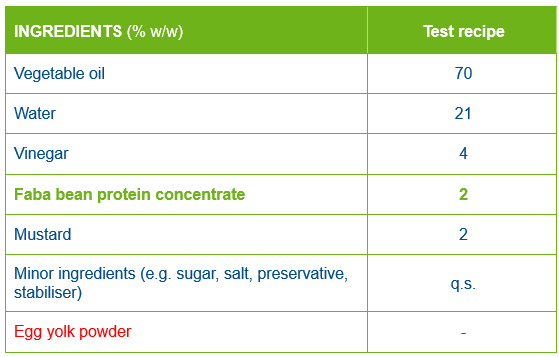
Textured Faba Bean Flakes: Elevating Hybrid Meat Products
Faba bean ingredients play an important role in the Meatless® range, a brand that is part of BENEO and specializes in texturized plant-based ingredients for the food industry. While BENEO produces high-quality faba bean proteins, these are also used within the Meatless® portfolio to create innovative textured solutions, resulting in texturized flakes with a higher protein content. These flakes contribute to texture, juiciness and mouthfeel in hybrid and plant-based meat applications such as burgers, minced meat and chicken.
As such, BENEO and Meatless® leverage the full potential of the faba bean, in the format of flour, protein concentrate and texturized flakes, providing manufacturers with cost-effective, sustainable and highly functional solutions for the evolving food industry.
Meatless®: A Pioneer in Hybrid and Plant-Based Solutions
Meatless® is a trusted supplier of texturized plant-based ingredients that help food manufacturers create tasty, juicy and cost-effective meat alternatives and hybrid products. With a focus on sustainable ingredients, Meatless® texturized ingredients are designed to integrate seamlessly into both fully plant-based and hybrid formulations, offering flexibility without compromising on product experience.
Why Use Textured Faba Bean Flakes in Hybrid Applications?
Textured Faba Bean Flakes are an excellent addition to meat-based products, delivering the right juicy texture at an optimized cost, improving texture, and enhancing juiciness while maintaining the familiar sensory experience that consumers expect.
✔ Boosts Texture & Bite — Textured Faba Bean Flakes provide a firm yet tender structure, making them ideal for hybrid applications like burgers and chicken products. They help replicate the meaty texture that consumers love.
✔ Enhances Juiciness & Mouthfeel — Retaining moisture is essential for ensuring that hybrid products are as succulent and satisfying as the conventional product. Faba bean-based texturates contribute to a juicy, well-balanced bite, preventing dryness in formulations due to the excellent water holding capacity.
✔ Pleasant Taste for Easy Integration — Unlike some plant proteins that require extensive masking, Textured Faba Bean Flakes have a relatively neutral flavour profile, so the taste of the meat part is contained, whether it is beef or chicken.
✔ Versatile Off-White Colour — Their light, off-white appearance ensures they blend effortlessly into various meat applications, maintaining an authentic and appetizing look in the final product.
A Variety of Hybrid Applications Is Well Within Reach, Some Examples Below
Hybrid Burgers — Texturized Faba Flakes add a succulent structure, helping to reduce the meat content while keeping the desired bite and juiciness. This can also decrease costs significantly, depending on the actual meat prices.
Chicken-Based Products — Works well in nuggets, patties and fillets, enhancing the tenderness and texture of hybrid formulations.
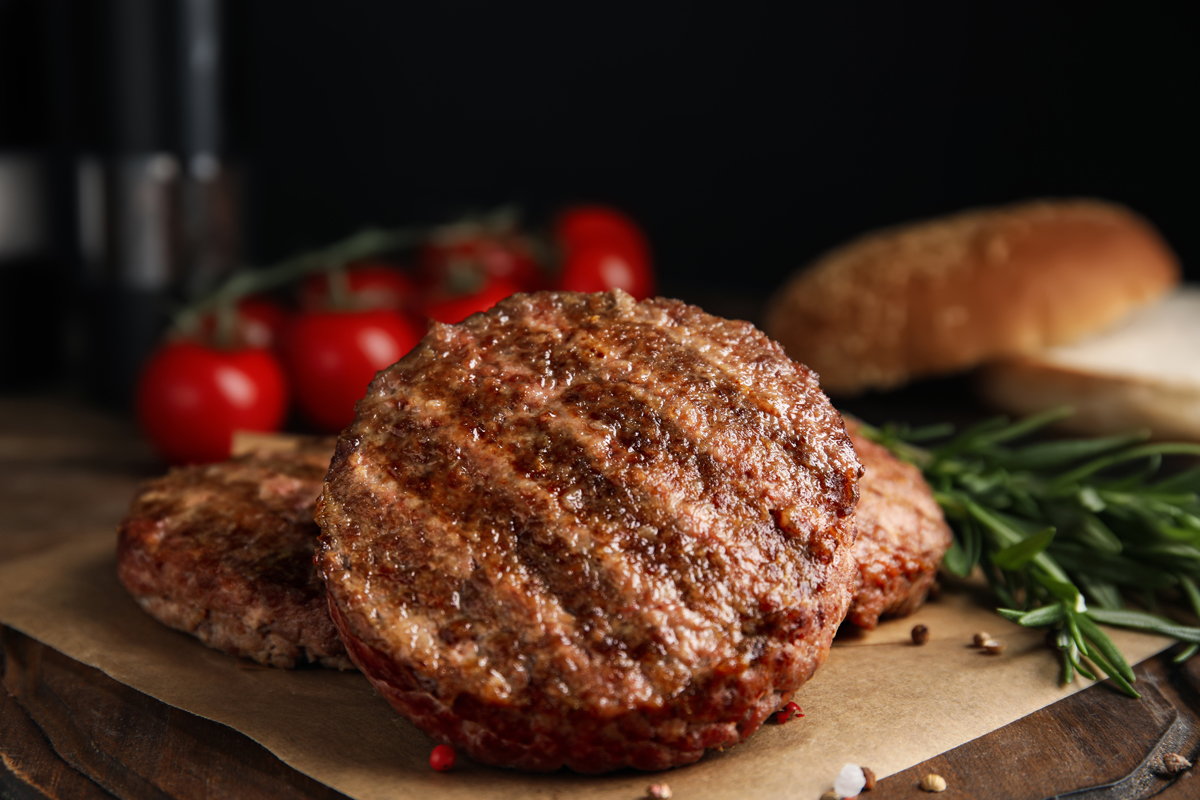
With Textured Faba Bean Flakes, manufacturers can reduce meat content, improve cost efficiency and create products that appeal to health-conscious and flexitarian consumers. This is all done while maintaining the sensory experience of traditional meat.
The Future of Faba Bean: Innovation and Growth in Savoury Applications
The demand for plant-based protein concentrates has surged in recent years, driven not only by the growing popularity of vegetarian, vegan and flexitarian diets but also by their remarkable versatility.
Consumer research shows a solid perception of faba beans (and also rice and wheat) being a sustainable and nutritious source of protein in foods and beverages. Market analysts predict that this demand will remain strong, fuelled by the ongoing consumer interest in plant-based options and the increasing focus on protein consumption.
The cost of producing meat is set to rise as the food industry faces increasing pressure. Stricter environmental regulations, resource constraints and the push for lower emissions are adding financial strain on farmers and producers, further driving up meat prices. This shift is accelerating the need for cost-effective alternatives, making plant-based and hybrid meat solutions more attractive than ever. By integrating plant-based ingredients, manufacturers can mitigate cost fluctuations, reduce reliance on the availability of meat and meet consumer expectations for more sustainable food options.
Experts at the BENEO-Technology Center are continuously working on exploring the extensive options of faba bean. As a result, we can expect to see even more diverse applications of faba bean protein in the coming years, including improved texturates, enhanced functional properties and tailored solutions for different culinary traditions worldwide.
With its sustainable plant-based appeal and cost-effectiveness, faba bean protein is poised to shape the future of savoury food formulations. Now is the time for manufacturers to explore its full potential and bring the next generation of delicious, sustainable and innovative food products to market.
To learn more about faba bean protein, visit this webpage.
Sources: MarketsandMarkets Analysis On The Plant-Based Protein Market; and BENEO Global Plant-Based and Meat Hybrids Survey 2023.

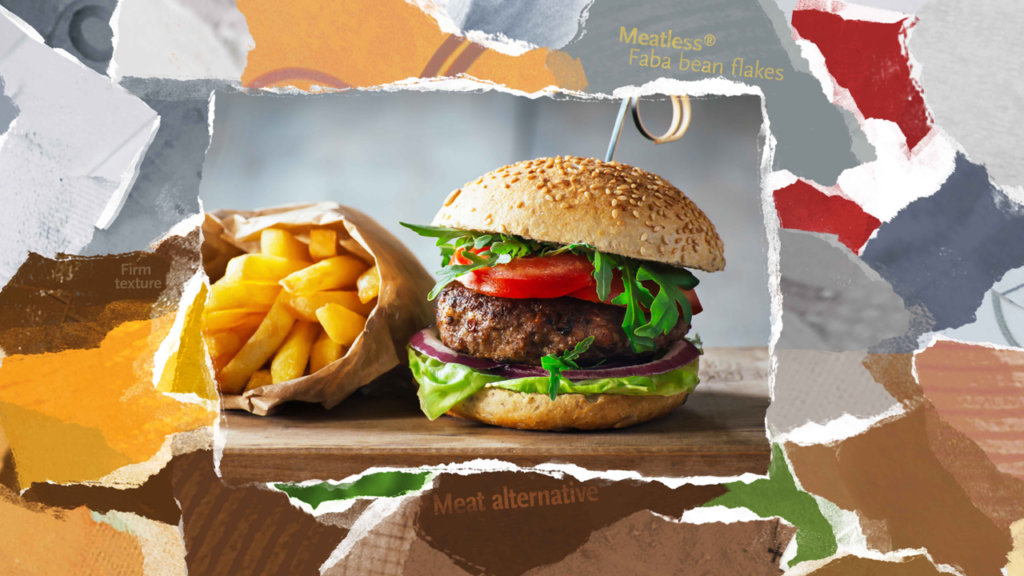


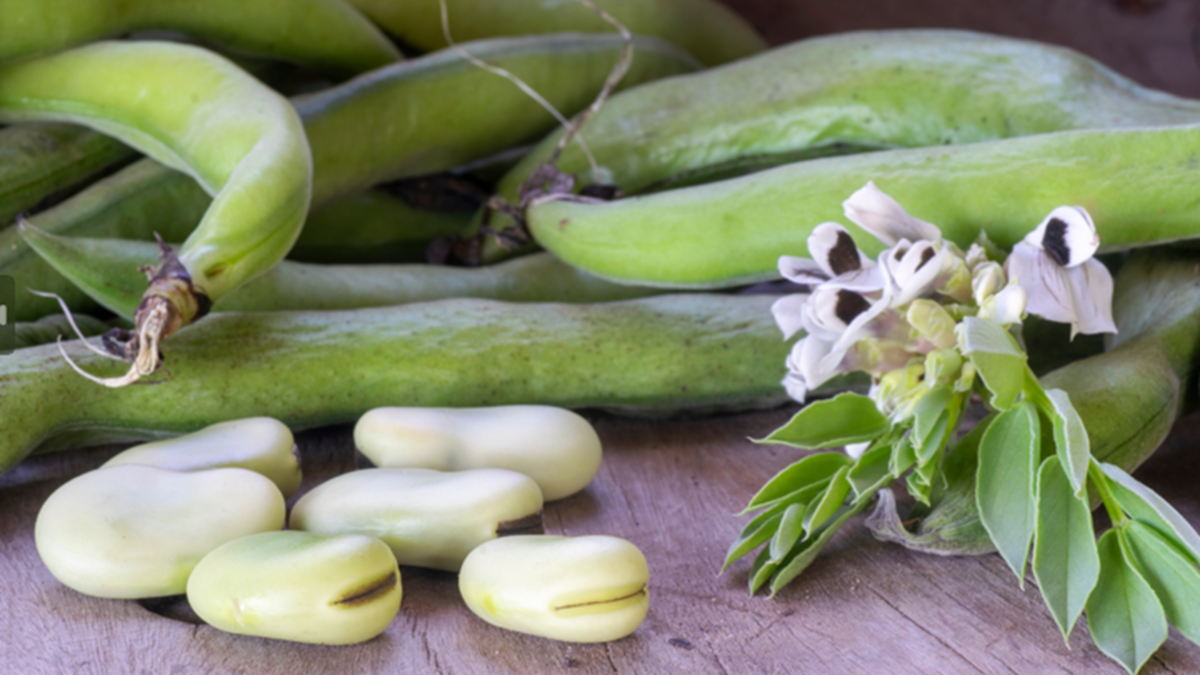





Join or login to leave a comment
JOIN LOGIN